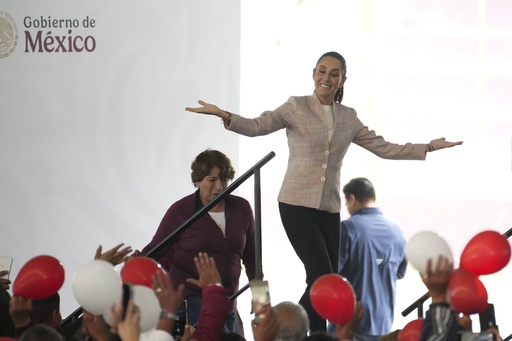
TORONTO — In response to the significant tariffs enacted by U.S. President Donald Trump, both Canada and Mexico have implemented retaliatory tariffs on American goods, prompting businesses and consumers in these countries to ponder the potential repercussions of this new trade fracas.
Canada introduced a 25% tariff on a range of American imports effective February 4, targeting beverages, cosmetics, and paper products amounting to approximately 30 billion Canadian dollars ($20 billion). A subsequent list detailing additional goods, including passenger vehicles, trucks, steel, aluminum, various fruits and vegetables, as well as beef, pork, and dairy products is expected to be released shortly. These additional items are estimated to be worth around 125 billion Canadian dollars ($85 billion).
Meanwhile, Mexico has voiced its intent to impose retaliatory tariffs but has yet to disclose specific rates or product categories. In light of the situation, Canadian Prime Minister Justin Trudeau and Mexican President Claudia Sheinbaum communicated via telephone on Saturday following the announcement of Trump’s tariffs, which include a 25% surcharge on goods from both nations and a reduced 10% rate on Canadian oil and Chinese imports.
Trudeau’s office confirmed their discussion, emphasizing a commitment to strengthening bilateral relations between Canada and Mexico. Although officials from Canada have engaged in detailed talks with their counterparts in Mexico, a senior Canadian official refrained from affirming a coordinated response. Trudeau took to social media, advocating for consumers to prioritize Canadian-made products, urging, “Now is the time to choose products made right here in Canada.”
Canada represents the largest export market for 36 states in the U.S., while Mexico holds the status of the U.S.’s largest trading ally. Despite the threats from Trump to escalate tariffs if retaliatory measures were introduced, Canada and Mexico proceeded with their own tariffs. Trudeau asserted late Saturday that while they hope to avoid further escalation, they are resolute in defending Canada’s interests.
In various provinces including Ontario, British Columbia, Quebec, Manitoba, and Nova Scotia, authorities planned to remove American liquor brands from government store shelves. Ontario Premier Doug Ford highlighted that nearly $1 billion in American alcoholic products are sold annually through the Liquor Control Board, proclaiming, “Not anymore.” Starting Tuesday, actions will be taken to exclude these American products from their offerings, significantly impacting Ontario-based businesses and restaurants reliant on U.S. imports.
Amid these political developments, Canadians began contemplating alternatives to American goods, with discussions unfolding on social media platforms. Trudeau directly addressed American citizens, warning of the tangible consequences that the tariffs will have on their lives as well.
In a striking response, Trump criticized Canada’s trade surplus with the U.S., suggesting that without it, Canada would struggle to sustain its viability as a nation. He posited that Canada could benefit by becoming the “Cherished 51st State,” emphasizing lower taxes and superior military support, along with an absence of tariffs.
A palpable sense of betrayal permeated among Canadians towards their closest neighbor, as Trudeau reminded Americans of the shared sacrifices made by Canadian troops alongside their U.S. counterparts. Demonstrating this sentiment, Canadian hockey fans expressed their discontent by booing the U.S. national anthem at NHL games, a trend that continued at an NBA game in Toronto featuring the Raptors and the Los Angeles Clippers.
Joseph Chua, an importer attending the Raptors game, indicated that the imposed tariffs would impact his purchasing decisions directly. He expressed a sense of bitterness, stating it was his first time abstaining from standing during the anthems, a practice he typically observes with respect.
In Mexico, the government’s comments regarding the tariff threat have been measured, underscoring a readiness to defend its interests. In a previous instance in 2019, Mexico sidestepped Trump’s tariffs by tying immigration control to the duties of its National Guard, but current allegations concerning Sheinbaum’s administration beckoned a fierce retort. She called on the United States to address its issues surrounding drugs and firearms and not interfere in Mexico’s matters.
Across Mexico, citizens were taking in the news, and some remained largely uninformed about the new tariffs. Observing from a small downtown café, 40-year-old salesperson Carlos Barona remarked that he wasn’t overly concerned, expressing confidence in his government’s handling of the situation. Despite his disdain for U.S. policies, he acknowledged consuming brands like Coca-Cola.
Conversely, Miriam Tenorio, who sells fruits and vegetables at a local market, expressed her willingness to boycott American products if collectively supported by fellow Mexicans, especially regarding items like Coca-Cola.
Residents in Mexicali, a city on the U.S. border, voiced apprehensions about the broader ramifications of a burgeoning trade conflict. Alejandro Acosta, a driver delivering vegetables to U.S. companies, feared that American businesses might retreat from Mexico, which would subsequently lead to job losses in the region.
In the wake of Trump’s election victory, Canadian leaders have often pointed fingers at Mexico regarding trade and border difficulties, a sentiment that continues among some officials today. Doug Ford, Ontario’s premier, reiterated, “Canada is not the problem. The problem is the Mexican border and China. That’s where the issue lies.”
As Canada heads into an election cycle, the implications of this trade dispute loom larger. Trudeau’s Liberal Party is set to announce a new leader by March 9, with a spring election on the horizon. Mark Carney, a frontrunner to succeed Trudeau, declared, “Canada will not bow down to a bully,” signaling a staunch defense of national interests amidst growing tensions.

